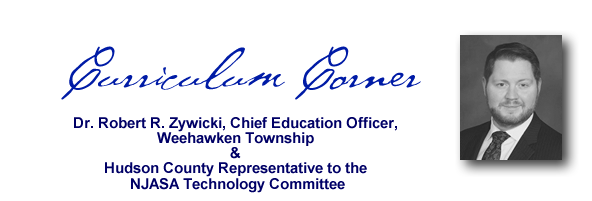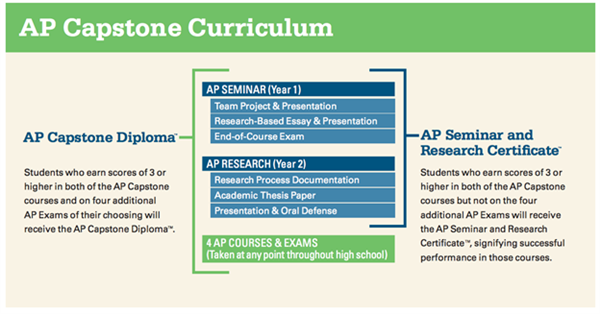- NJASA
- Curriculum Corner June July 2017


-

Weehawken Launches New College Board Diploma Program
In 2016, the Weehawken Township School District adopted a strategic goal to increase access to the most rigorous curricula via The College Board’s Advanced Placement (AP) Program. AP courses enable willing students to pursue college-level studies — with the opportunity to earn college credit, advanced placement, or both — while still in high school. AP Participation is an established pathway to college readiness. Research indicates that students who score a 3 or higher on an AP Exam typically experience greater academic success in college and are more likely to earn a college degree than non-AP students.
Equity and Access
ALL Weehawken High School students are now invited to participate in the District’s 31 AP courses. Draconian placement tests and unnecessary prerequisites that limit access to AP have been eliminated. Instead, the focus is on having personalized conversations with students about what courses fit their interests and career aspirations. Additionally, school counselors are actively seeking out 7th graders to discuss the opportunities afforded to students who challenge themselves by participating in AP courses. AP teachers at Weehawken differentiate their instructional strategies to meet the needs of ALL learners. Subsequently, Weehawken was selected by the College Board to implement AP Capstone — an innovative high school diploma program that allows students to develop the skills that matter most for their future college success: research, collaboration, and communication. AP Capstone complements the in-depth, subject-specific rigor of AP courses and exams. The AP Capstone Program includes a two-course sequence: AP Seminar and AP Research. AP Capstone was developed in direct response to feedback from higher education faculty and college admission officers to offer a project-based AP program that focused on research.
Rigor and Relevance
Weehawken High School launched the AP Capstone Program in September 2016. Students who complete AP Seminar and AP Research with scores of 3 or higher, and receive scores of 3 or higher on four AP Exams in subjects of their choosing, will receive the AP Capstone Diploma. Students who earn scores of 3 or higher on the two AP Capstone exams but do not take or earn qualifying scores on four additional AP Exams will receive the AP Seminar and Research Certificate.

The AP Seminar course, typically taken in 10th or 11th grade, equips students with the power to explore academic and real-world issues from multiple perspectives. Through a variety of materials — from articles and research studies to foundational and philosophical texts — students will be challenged to explore complex questions; understand and evaluate opposing viewpoints; interpret and synthesize information; and develop, communicate, and defend evidence-based arguments. Teachers have the flexibility of choosing themes based on student interests, whether they are local, regional, national, or global in nature. Samples of themes that can be covered in the AP Seminar course include education, innovation, sustainability, and technology. By tapping into students’ personal interests, AP Capstone gives a broader array of students an entry point into challenging course work. Students are assessed through both an individual project and a team project completed during the year and a year-end written exam.
The AP Research course allows students to design, plan, and conduct a yearlong investigation on a topic of their choosing with support from experts at the university level or in the community. Students will build on the skills learned in the AP Seminar course by using research methodology; employing ethical research practices; and accessing, analyzing, and synthesizing information to present an argument. At the end of the course, students have the confidence to present and orally defend their own scholarly academic research.
Research into Action
The first cohort of Weehawken AP Capstone students presented highlights of their original research at the June 7th meeting of The New Jersey State Board of Education in Trenton. The eager students detailed the QUEST research process that encourages students to come to logical conclusions based on evidence, rather than on opinion. As Weehawken Senior Jose Mesa explained, “We are viewing each topic from multiple perspectives; viewpoints; and lenses.” AP Capstone student, Veronica Varghese, presented highlights from her thesis, How can we address the negative factors associated with technology? explaining how social media companies specifically design their websites to “get people hooked.” Another Weehawken AP Capstone student, Aramita Sanchez, posed the question: Are schools tending to the needs of minority students? She also included special education students in that group. Short answer: No, not completely, but as a result of Sanchez’s research, the AP Capstone students have developed a model proposal for student affinity groups as a way for high schools to engage traditionally marginalized students. As Mesa told the Board, the Weehawken students’ projects do not always culminate with just their research presentations and AP exams, but rather when the research translates into meaningful action in their schools and communities.
Early Signs of Success
Since adopting an open access policy to AP courses, Weehawken’s AP Exam participation increased 83% from the previous year. On-campus college visitations have increased dramatically as recruiters are seeking out AP Capstone students. This year’s college acceptances include Johns Hopkins, Northwestern, Yale, Michigan, Boston College, Georgia Tech, USC, and Case Western Reserve. The success of the first year of AP Capstone has created a buzz among rising underclassmen and their parents, who are excited by the opportunities now available in their local public high school. More importantly, the AP Capstone Program has started a conversation in the community not just about getting students accepted into college, but having the skills to succeed in college and then make a difference with an action-based scholarship.

